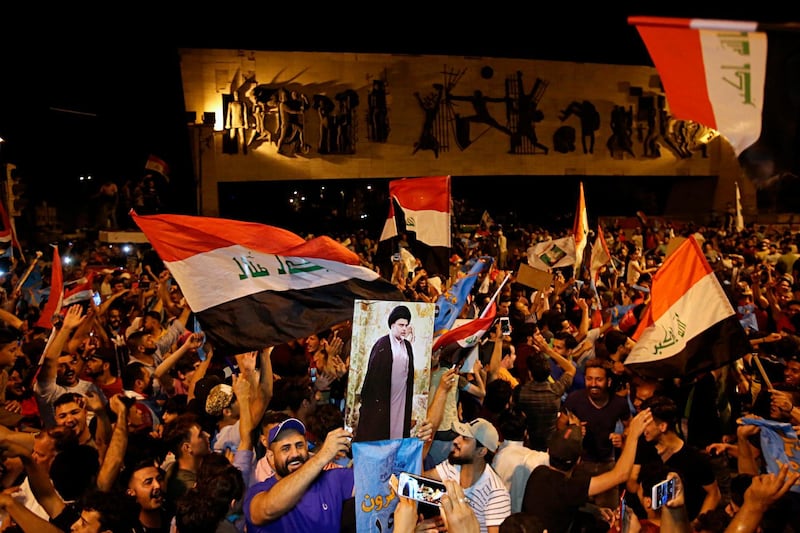Iraqi Prime Minister Haider Al Abadi said on Monday he was ready to co-operate to form a strong, non-sectarian government after surprising early results placed his bloc third in Saturday's elections.
Firebrand cleric Moqtada Al Sadr, who once led a militia against American troops in Iraq, took the lead in initial returns, with his Marching Towards Reform (Sairoon) alliance of Shiite nationalists and communists taking six of Iraq’s 18 provinces and coming second in four others.
Shiite militia leader Hadi Al Ameri's Conquest Alliance, made up of ex-fighters from mainly Iran-backed paramilitary units that battled ISIS, was in second place after winning four provinces and placing second in eight others.
If confirmed by Iraq's electoral commission, the results could upend the nation's political balance.
Mr Al Abadi had been tipped as a pre-election favourite. But in a conciliatory statement on Monday, he called on citizens to respect the results and put the well-being of the country first. “We are ready to work and co-operate in forming the strongest government for Iraq that’s free of corruption,” Mr Al Abadi said.
_________
Read more
Iraq's firebrand cleric Moqdata Al Sadr makes comeback in vote
Iraqi jets strike ISIS command centre in Syria
Iraq elections attack kills security forces south of Kirkuk
_________
Mr Al Sadr himself did not run in the election, so cannot be appointed prime minister, but if his bloc's results are confirmed he may be in a position to determine Iraq's next leader.
Both Mr Al Sadr and Mr Al Ameri are long-time political veterans well known to Iraqis, but both campaigned to sweep the country's reviled elite from politics.
Voter turnout was 44.52 per cent, the Independent High Electoral Commission said, significantly lower than in previous elections.
Full results were due to be officially announced late on Monday but the early ballots of 700,000 security personnel and diaspora remain uncounted, meaning Mr Al Abadi could still get a boost.
Widespread disillusionment with Iraq’s current political class appears to have boosted Mr Al Sadr’s coalition. While many disillusioned Iraqis boycotted the vote, Mr Al Sadr's supporters could be relied upon to mobilise, said senior research fellow at London-based think tank Chatham House Renad Mansour.
"He has a concrete base that's very loyal to him, this is based on protest movements that emerged in 2015 and that's why he came first in Baghdad," Mr Mansour told The National. "This shows to some extent that this election was an anti-establishment balloting, the results are a very clear indictment of the political elite."
Mr Al Sadr is one of the few Iraqi Shiite leaders to have kept his distance from neighbouring Iran. A staunch nationalist, he has criticised foreign influence in Iraq and labelled the country's current political leadership as deeply corrupt.
The 44-year-old derives much of authority from his family, inheriting millions of followers from his father, a revered grand ayatollah killed by the regime of former strongman Saddam Hussein. After the 2003 United States invasion, Mr Al Sadr formed the Mahdi army militia to fight American troops and later commanded his paramilitary forces against ISIS.
What happens next?
Iraq’s complex electoral system means that the final make-up of the 329 seat parliament is still far from decided.
Prolonged negotiations between the main political groups are likely before a new government can be formed.
Observers predict Mr Abadi will try to form a deal with Mr Al Sadr, although the cleric’s attitude towards Mr Al Abadi’s bloc remains unknown.
Recent history has shown that winning a plurality of seats does not necessarily translate into gaining the premiership. In 2010's election, vice president Ayad Allawi’s National Alliance won the largest number of seats but he was blocked from becoming prime minister, which he blamed on interference from Tehran.
Instead, former Prime Minister Nouri Al Maliki was able to remain in power by forming a majority government with other blocs.
Accordingly, horse trading between the blocs will now assume a greater importance.
"What matters now is post-election alliances," said Balsam Mustafa, an Iraq expert and PhD candidate in Modern Languages at the University of Birmingham.






